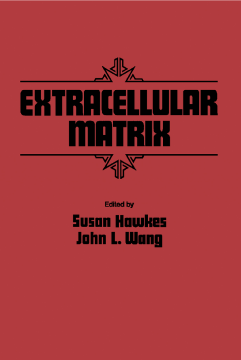
Additional Information
Book Details
Abstract
Extracellular Matrix contains the proceedings of the symposium ""The Extracellular Matrix,"" sponsored by the Michigan Molecular Institute and held in Midland, Michigan, on June 28-July 2, 1982. The papers explore the role played by the extracellular matrix (ECM) in the physiology of a cell, particularly in the regulation of cellular phenotypes, differentiation, and proliferation. The progress made in isolating and defining the chemistry and functional interactions of the ECM components is discussed, along with the biology of the ECM.
This book is comprised of 52 chapters and begins with an introduction to the ECM, with emphasis on the question of whether the malignant process can be defined in a cell culture model, and in particular, whether the pericellular matrix is characteristically altered in cancer. The discussion then turns to the structure of the heparan sulfate proteoglycans and the molecular mechanisms responsible for the association of these molecules with the surfaces of cultured cells. Subsequent chapters focus on the chemistry of ECM components such as collagen, glycosaminoglycans, and adhesive glycoproteins, along with their functional interactions, biosynthesis, turnover, and degradation. The final section is devoted to the diseased states of ECM.
This monograph should serve as a valuable reference for biochemists as well as undergraduate and graduate students of biochemistry.
